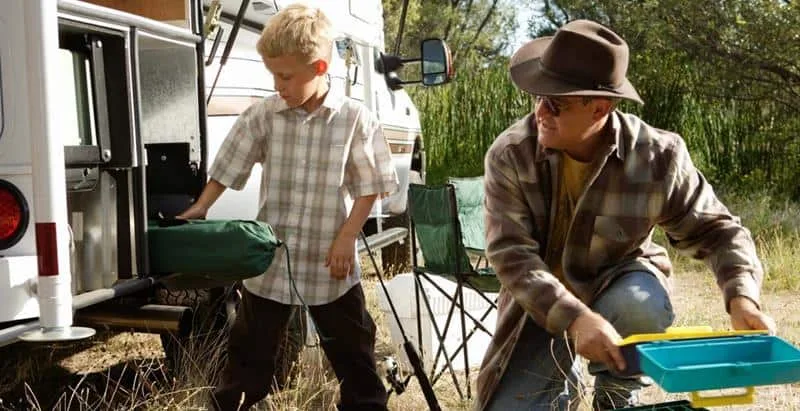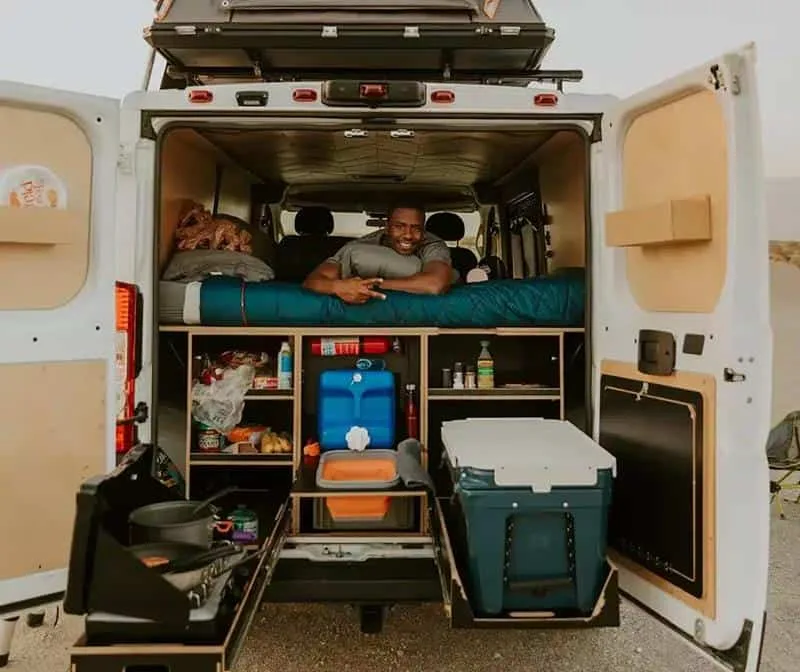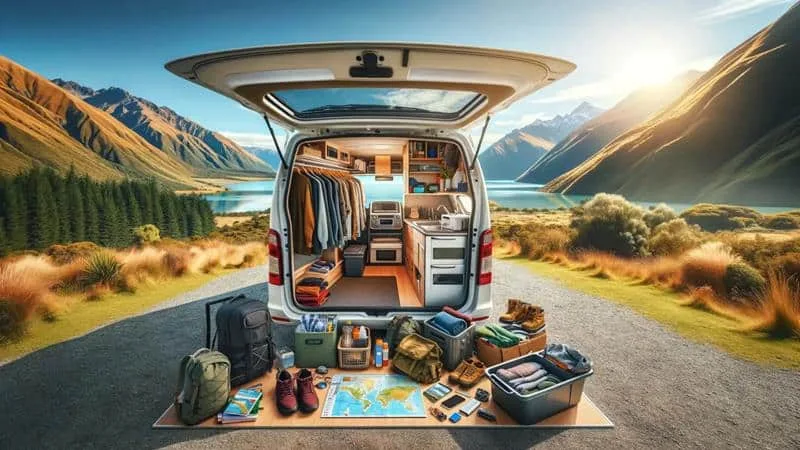Introduction
Motorhome camping is the ultimate way to experience the great outdoors without sacrificing comfort. It combines the freedom of the open road with the convenience of having your home on wheels. However, the success of your trip hinges on one key factor: proper preparation, which is where a detailed motorhome checklist comes into play. There’s nothing more frustrating than realizing you’ve forgotten something essential once you’ve hit the road or arrived at your campsite. That’s why it’s crucial to pack well and stay organized with a motorhome checklist throughout the process. A well-thought-out packing system can mean the difference between a smooth, enjoyable trip and a stressful one.
By organizing your gear into categories, such as personal items, kitchen supplies, and outdoor gear, you can pack efficiently and not leave any essential items behind. Categorizing and checking off items as you go is the best way to stay on top of your needs, whether preparing for a weekend getaway or an extended road trip. While some items are non-negotiable, like your driver’s license or a first-aid kit, others might be comfort items that enhance your experience but aren’t strictly necessary. A reliable motorhome checklist will ensure you’ve packed everything for a safe and enjoyable journey, no matter the length of your trip.

In this guide, we’ll cover the essential items no motorhome camper should leave behind and optional items that can add convenience or fun to your journey. A well-prepared motorhome checklist guarantees you’ll have everything you need for a successful trip. Let’s get started with the essentials.
Essential Items to Pack
Personal Essentials
- Driver’s license: Ensure you have your driver’s license readily available in case of any roadside checks or emergencies.
- RV registration: Keep your RV registration in a safe and accessible spot. You’ll need it at many campgrounds and for legal purposes.
- Insurance papers: Always travel with your insurance papers to cover any unforeseen events.
- Wallet: Carry your ID, credit cards, and any necessary documents in your wallet.
- Cash: Some campgrounds and small towns may only accept cash, so keep a small amount handy.
- Credit cards: Ensure you have your credit cards for fuel, groceries, or any emergencies that might arise.
- Prescription medications: Bring all necessary medications, including extras, if your trip is delayed.
- First aid kit: A complete kit with bandages, antiseptics, and basic medical supplies is essential for any outdoor adventure.
- Sunglasses: Protect your eyes during those bright days on the road or out hiking.
- Hat: A wide-brim hat will protect you from the sun while you’re out and about.
- Sunscreen: Ensure you have enough sunscreen to reapply throughout the day, especially when hiking or swimming.
- Insect repellent: Protect yourself from insect bites with an effective repellent, especially in bug-heavy areas.
- Cell phone: Keep your phone charged and ready for navigation or emergency use.
- Charger: Bring a phone charger, ideally with a car adapter, to keep your devices powered up.
- Clothing appropriate for the weather: Pack clothing that suits the climate of your destination, plus a few extra layers.
- Layers: Even in warmer areas, temperatures can drop in the evenings, so be prepared with extra layers.
- Toothbrush: Maintain your daily hygiene with a toothbrush, even off the beaten path.
- Toothpaste: Don’t forget the toothpaste! Compact travel tubes are great for camping.
- Deodorant: Stay fresh and comfortable with deodorant for those active outdoor days.
- Shampoo and soap: Opt for biodegradable options if camping in eco-friendly areas.
- Towels: Quick-dry towels are convenient and save space in your RV.
- Washcloths: Handy for quick washes or cleaning up messes.
- Comfortable walking shoes: Ensure you have sturdy, comfortable shoes for hiking and exploring.
- Slippers: Relax in your RV with a cozy pair of slippers.
RV-Specific Gear
- RV leveling blocks: Ensure your RV is balanced on uneven ground to avoid appliance issues or sleeping discomfort.
- Sewer hose: A reliable sewer hose is a must for managing waste at campsites.
- Sewer hose support stand: Helps your hose stay elevated for a smooth flow and prevents blockages.
- Freshwater hose (potable water): Always use a potable water hose to refill your RV’s water tank safely.
- Water filter: A filter ensures that the water you drink or use in your RV is safe and clean.
- Water pressure regulator: Protect your RV’s plumbing from high-pressure campground water supplies.
- Electrical power cord: Ensure your RV’s electrical cord is in good shape for connecting to campsite hookups.
- Adapters: Carry power adapters if the campsite’s connection doesn’t match your RV’s setup.
- Wheel chocks: Prevent your RV from rolling by placing wheel chocks when parked.
- Fire extinguisher: Ensure your fire extinguisher is easily accessible and in working order.
- RV GPS: Use an RV-specific GPS to avoid low-clearance bridges and other road hazards.
- Maps: Paper maps are a great backup in case of GPS failure or dead zones.
- RV owner’s manual: Keep your manual handy for troubleshooting any issues while on the road.
- Maintenance tools: Pack an essential toolset for minor repairs and adjustments.
Kitchen Supplies
- Pots: Bring a small set of pots, ideally ones that nest together to save space, for cooking meals in your RV.
- Pans: Non-stick pans are easier to clean and perfect for cooking everything from eggs to stir-fries.
- Cooking utensils: Don’t forget spatulas, tongs, and serving spoons to make cooking on the road hassle-free.
- Plates: Durable, reusable plates (preferably lightweight and shatterproof) are essential for mealtimes.
- Bowls: Great for soups, salads, or breakfasts; make sure they’re stackable for space-saving.
- Cups: Insulated cups are handy for hot and cold drinks and prevent spills while driving.
- Cutlery: Pack reusable cutlery, including forks, knives, and spoons, for each family member.
- Dish soap: Biodegradable dish soap is ideal for washing dishes while protecting the environment.
- Sponge: Bring a durable sponge or dishcloth to clean up after meals.
- Drying rack: A collapsible drying rack will help keep your dishes organized and speed up drying time.
- Trash bags: Essential for keeping your RV clean and maintaining the “leave no trace” camping ethic.
- Paper towels: Handy for quick clean-ups or drying hands while on the go.
- Napkins: Keep a small stash of paper or reusable napkins for mealtimes.
- Cutting board: A compact cutting board helps prep vegetables, fruits, and meats.
- Knives: Bring a chef’s and paring knives for versatile cooking needs.
- Salt, pepper, and basic spices: Pack small containers of your go-to seasonings to add flavor to your meals.
- Coffee maker: Whether it’s a French press, pour-over, or a small electric maker, don’t forget your coffee setup!
- Coffee/tea: Stock up on your favorite ground coffee or tea bags for those early mornings or cool evenings.
- Food for meals: Plan your meals in advance and pack shelf-stable or refrigerated ingredients.
- Snacks: Take healthy snacks like trail mix, dried fruit, and granola bars for on-the-go energy.
- Refrigerator/freezer items: Pack perishables like eggs, dairy, and meats that you’ll use early in the trip.
Bedding & Comfort
- Sheets: Comfortable, fitted sheets that match your RV bed size will help you sleep soundly.
- Blankets: Bring both lightweight and warm blankets depending on the season and location of your trip.
- Pillows: Don’t forget your favorite pillows to keep things as cozy as possible.
- Extra bedding: Bring extra sheets or blankets in case of spills, accidents, or unexpected guests.
- Sleeping bags: If camping in colder regions, a sleeping bag with the right temperature rating can be a lifesaver.
- Camping chairs: Lightweight, foldable chairs are perfect for relaxing outside your RV and enjoying the view.
- Outdoor mat or rug: A weatherproof rug or mat will help keep dirt and mud from being tracked into your RV.
Outdoor Gear
- Flashlights: A high-quality flashlight with extra batteries is essential for navigating the campsite at night.
- Lanterns: Portable lanterns are great for lighting up larger areas like picnic tables or campfire spots.
- Camping grill: If you plan on cooking outside, a compact grill makes preparing meals under the stars easy.
- Stove: A portable camping stove is another excellent option for outdoor cooking, especially when a campfire isn’t allowed.
- Fire starters: Bring reliable fire starters or waterproof matches to get your campfire going quickly.
- Matches: Windproof matches are a great backup when lighters and other fire starters fail.
- Lighter: A refillable lighter is a convenient tool for lighting both campfires and grills.
- Cooler: If you run out of refrigerator space, an insulated cooler can keep drinks and perishables cold.
- Folding table: If your campsite doesn’t have a picnic table, a folding table is perfect for meal prep or dining.
- Portable water containers: Carry extra water for drinking, cooking, or cleaning, especially camping in remote areas.
- mosquito netting: If you’re camping in a buggy area, mosquito netting can make outdoor lounging much more comfortable.
- Canopy: A portable canopy offers shade during the day and protection from light rain.
- Backpack: A sturdy daypack is ideal for hikes or day trips away from the campsite.
Emergency Supplies
- Jumper cables: Always keep jumper cables in your RV if your vehicle or another camper needs a jump.
- Spare tire: Make sure you have a functional spare tire and know how to change it if needed.
- Jack: A reliable jack will make changing your tire faster and safer.
- Tire repair kit: Keep a tire repair kit handy in case of punctures or small leaks.
- Duct tape: Duct tape can solve a multitude of problems, from patching leaks to securing loose items.
- Zip ties: Zip ties are great for securing loose wires, tarps, or equipment in a pinch.
- Multi-tool: A good multi-tool with pliers, screwdrivers, and other attachments can handle minor repairs.
- Pocket knife: A sharp pocket knife is helpful for everything from preparing food to cutting rope.
- Emergency road flares: In case of breakdowns, road flares or warning triangles will keep you visible to other drivers.
- Reflectors: Attach reflectors to your RV or use reflective gear to stay safe if you’re on the side of the road.
- Spare keys: Always keep an extra set of RV keys hidden in a safe spot if you lose your main set.

Optional Items to Consider Packing
While essential items are crucial for safety and basic comfort, optional items can significantly enhance your motorhome camping experience. These extras may not be strictly necessary, but they can make your trip more enjoyable, convenient, and personalized.
Whether you’re seeking additional entertainment, extra comfort, or outdoor adventure gear, these optional items help tailor your motorhome adventure to your specific needs and preferences.
Adding a few of these items to your motorhome checklist will prepare you for planned activities and unexpected opportunities that arise during your journey.
Comfort and Convenience
- Portable generator: Ideal for off-grid camping, a portable generator provides reliable power for electronics and appliances.
- Solar panels: A sustainable alternative to a generator, solar panels can keep your RV battery charged without fuel.
- Satellite TV or portable TV antenna: Enjoy entertainment by setting up a portable satellite TV or using a simple antenna.
- Laptop or tablet: These are great for staying connected or working remotely while on your trip. Remember the chargers!
- Outdoor games: Bring lightweight outdoor games like frisbee or cornhole to keep the whole family entertained.
- Binoculars: Perfect for birdwatching or enjoying scenic views from a distance.
Extra Kitchen Items
- Coffee grinder: For fresh coffee lovers, a portable coffee grinder is a must for brewing your favorite beans on the go.
- Instant Pot: An Instant Pot can be a space-saving and versatile cooking option, allowing you to prepare a variety of meals easily.
- Slow cooker: This is great for cooking meals while you’re out exploring for the day. It’s perfect for making stews, soups, or roasts.
- Extra ice packs: Reusable ice packs are a good way to keep perishables or beverages cold, especially when cooler space is limited.
- Portable ice maker: A compact ice maker ensures you have plenty of ice for drinks, even in the middle of nowhere.
- BBQ tools: Don’t forget your tongs, spatula, and grill brush to make outdoor grilling a breeze.
- Extra cooler: An extra cooler can store drinks and overflow food when your RV refrigerator is full.
Outdoor Adventure Gear
- Bikes and helmets: Perfect for exploring the campground or nearby trails, especially if you prefer active outdoor adventures.
- kayaks or inflatable boats: If your camping trip takes you near water, kayaks or inflatable boats are a great way to explore lakes or rivers.
- Fishing gear: Bring your rod, tackle box, and bait to enjoy some fishing while you’re camping near a lake, river, or ocean.
- Hiking poles: If you plan to hike rugged trails, hiking poles provide added stability and reduce strain on your legs.
- Sturdy boots: Good hiking boots will ensure your feet are protected and comfortable during long hikes.
- Camping tent: A tent is a fun and adventurous addition if the kids want to experience a night under the stars outside the RV.
Extra Entertainment
- Board games: Pack a few lightweight board games to pass the time during the evenings or rainy days inside the RV.
- Playing cards: A deck of cards is a compact, versatile game option that can entertain everyone from kids to adults.
- Bluetooth speakers: Enjoy music around the campfire or inside your RV with portable Bluetooth speakers.
- Camera or GoPro: Capture the beauty of your trip with a camera or GoPro, perfect for recording memories while hiking or biking.
- Journal or sketchbook: Record your thoughts, memories, or sketches of the places you visit to look back on later.
Additional Safety Items
- Bear spray: If you’re camping in areas known for wildlife, bear spray is essential for protection during hikes or while cooking.
- Whistle: A whistle can be used for safety, to signal others if you’re lost, or to scare off wildlife in more remote locations.
- Weather radio: A weather radio ensures you stay updated on weather conditions, especially in an area without cell service.
- Portable water purifier: For off-grid camping, a water purifier provides safe drinking water from natural sources like rivers or lakes.
Personal Extras
- Extra toiletries: To stay clean and fresh during longer trips, use hand sanitizer, body wipes, or travel-sized shampoo.
- Foldable laundry basket: A foldable laundry basket helps keep dirty clothes contained and organized until they can be washed.
- Laundry detergent: Bring laundry detergent if you plan on doing laundry at a campsite or during a more extended trip.
- Yoga mat: Perfect for staying active and stretching out after a long day of driving or hiking.
- Exercise equipment: Bring light, portable equipment like resistance bands for a quick workout on the road.
Want a Spreadsheet or Print-Out?
Register here to download a fillable Excel sheet or printable PDF document of the motorhome checklist to use when planning your trip.
Summary
A well-prepared trip begins with a thorough motorhome checklist. Whether it’s your first trip or your fiftieth, having an organized packing system ensures you won’t forget anything important. Essential items like personal identification, first aid kits, and RV-specific gear are non-negotiable, while additional comforts like outdoor adventure gear and entertainment options can enhance your camping experience. Regardless of whether you’re travelling in a camper van or a large motorcoach, using a comprehensive motorhome checklist will streamline your packing process and eliminate the worry of leaving critical items behind, giving you peace of mind on the road.

Beyond the basics, adding optional items to your motorhome checklist allows you to customize your trip to your preferences. Whether you bring extra kitchen tools for gourmet cooking, outdoor gear for exploring nature, or entertainment options for downtime, the proper motorhome checklist will ensure you have everything you need to make your trip enjoyable. Ultimately, the key to a successful motorhome adventure is thoughtful preparation—and it all starts with a carefully crafted motorhome checklist. With everything packed and organized, you can focus on creating memories and enjoying the journey ahead, knowing you’ve covered all the essentials.



